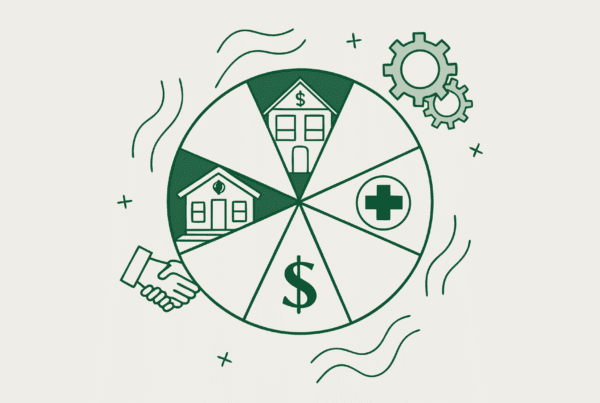Selling your Geriatric Behavioral Health practice in Nebraska presents a unique opportunity in today’s market. With an aging population and growing demand for specialized mental healthcare, buyer interest is strong. This guide provides key insights into the current market, the selling process, and how to value your practice accurately. Strategic preparation is the key to a successful transition that protects your legacy and maximizes your financial outcome.
Market Overview
The Nebraska healthcare market offers a stable and promising environment for Geriatric Behavioral Health practice owners considering a sale. The state s demographic trends show a steadily aging population, which directly increases the demand for your specialized services. This creates a compelling story for potential buyers, from private equity groups to larger health systems, who are actively seeking established practices with strong community ties and a track record of care.
This demand is driven by several key factors:
- Growing Patient Base: An increasing number of seniors require specialized mental and behavioral support.
- Market Consolidation: Buyers are looking to enter or expand their footprint in underserved markets like Nebraska.
- High-Value Niche: Geriatric Behavioral Health is recognized as a critical and recession-resilient healthcare sector.
Key Considerations
As you consider a sale, several questions likely come to mind. How do you determine the right price for your practice, one that reflects its true value beyond just assets? How can you explore a sale without alerting your staff, patients, or competitors? And most importantly, how do you find the right type of buyer who will continue your legacy of care? Answering these questions requires a careful strategy. Maintaining confidentiality is critical, and finding a buyer who aligns with your clinical and cultural values is just as important as the financial offer. Planning for these aspects early in the process is foundational to a smooth and successful sale.
Market Activity
The current M&A market is active, with specific types of buyers showing significant interest in specialties like Geriatric Behavioral Health. Understanding who is buying helps you position your practice effectively.
Strategic Buyers
These are often larger regional health systems or established behavioral health platforms looking to expand their service area in Nebraska. They are typically focused on patient continuity and integrating your practice into their existing network. They value a strong local reputation and referral base.
Private Equity Investors
Financial buyers, including private equity firms, see Geriatric Behavioral Health as a highly attractive and growing field. They seek to partner with successful practices to provide capital and operational support for growth. For the right practice, this can lead to competitive, premium valuations as these groups compete for quality assets. This competitive tension often works in the seller s favor, but it requires a structured process to manage multiple interested parties at once.
The Sale Process
Selling a medical practice is not a single event but a multi-stage process. Each step requires careful planning and execution to protect your interests and achieve the best outcome. While every sale is unique, a typical transaction follows a structured path. We believe in running a formal process that creates competitive tension among qualified buyers, rather than simply listing your practice and waiting for an offer. This approach ensures you are in control.
| Phase | Key Actions |
|---|---|
| Phase 1: Preparation | We help you analyze financials, prepare documentation, and create a compelling story about your practice’s growth potential. |
| Phase 2: Valuation | A comprehensive valuation is performed to establish a credible and defensible asking price based on market data. |
| Phase 3: Marketing | Your practice is confidentially marketed to a curated list of qualified strategic and financial buyers. |
| Phase 4: Negotiation | We manage offers, negotiate terms, and help you select the best partner, not just the highest price. |
| Phase 5: Due Diligence & Closing | We support you through the buyer’s review process and work with attorneys to finalize the sale and ensure a smooth transition. |
Understanding Your Practice’s Value
Determining your practice’s value is more than a simple formula. While a common method is applying a multiple to your earnings, the key is understanding what “earnings” truly means to a buyer. We focus on Adjusted EBITDA (Earnings Before Interest, Taxes, Depreciation, and Amortization). Think of it as your practice’s true annual cash flow after normalizing for any owner-related expenses or one-time costs. This figure presents the clearest picture of profitability to a buyer. The multiple applied to that number depends on factors like your location, number of providers, growth history, and payer mix. Specialties like behavioral health often command strong multiples because of high demand, but a professional valuation is needed to tell the complete story and justify the highest possible price.
Planning for Life After the Sale
A successful sale isn’t just about the closing day. It’s also about what comes next for you, your staff, and your legacy. Thinking through your post-sale goals is a critical part of the process, as these goals will shape the type of buyer you seek and the structure of the deal itself. Many owners mistakenly believe a sale means losing all control, but that is often not the case. Modern deal structures can be designed to fit your specific needs.
You need a plan for a few key areas:
- Your Personal Role: Do you want to retire immediately, or would you prefer to stay on for a few years, focusing on patient care without the administrative burden? Your answer will influence the deal structure.
- Your Staff’s Future: Securing a future for your dedicated team is a priority for most owners. The right buyer will see your staff as a key asset and have a plan for retention and growth.
- Your Financial Future: The deal can be structured in different ways. You might take cash at closing, or you might “roll over” some equity to partner with the new group, giving you a second potential payday when they sell in the future.
Frequently Asked Questions
What makes the Nebraska market favorable for selling a Geriatric Behavioral Health practice?
Nebraska’s aging population drives a growing demand for specialized geriatric mental health services, creating a stable and promising market. Buyers such as private equity groups and larger health systems are actively looking for established practices with a strong local presence and a proven track record of care. This demand, combined with market consolidation trends, makes it a high-value niche and recession-resilient sector.
How is the value of a Geriatric Behavioral Health practice determined in Nebraska?
Practice value is primarily based on Adjusted EBITDA (Earnings Before Interest, Taxes, Depreciation, and Amortization), reflecting true annual cash flow after normalizing expenses. Factors influencing the multiple applied to this number include location, number of providers, growth history, and payer mix. A professional, comprehensive valuation is essential to justify and achieve the highest possible price.
What types of buyers are interested in acquiring a Geriatric Behavioral Health practice in Nebraska?
There are two main buyer types: strategic buyers like regional health systems seeking to expand their network and prioritize patient continuity, and private equity investors who are financial buyers looking to invest capital and support for growth. Both buyer types value practices with strong community ties and growth potential, but their focus and deal structures may differ.
What key steps are involved in the sale process of a Geriatric Behavioral Health practice?
The sale process typically includes: 1) Preparation—analyzing financials and preparing documentation, 2) Valuation—establishing a credible asking price, 3) Marketing—confidentially reaching qualified buyers, 4) Negotiation—managing offers and selecting the best partner, and 5) Due Diligence & Closing—supporting buyer reviews and finalizing the sale to ensure smooth transition.
How can a seller plan for life after selling their Geriatric Behavioral Health practice?
Sellers should consider their personal role post-sale (immediate retirement or remaining for a transition period), the future of their staff (retention and growth plans), and their financial future (deal structures such as cash at closing or equity rollover for potential future gains). Planning these factors early shapes the choice of buyer and deal terms, helping protect the seller’s legacy and goals.



